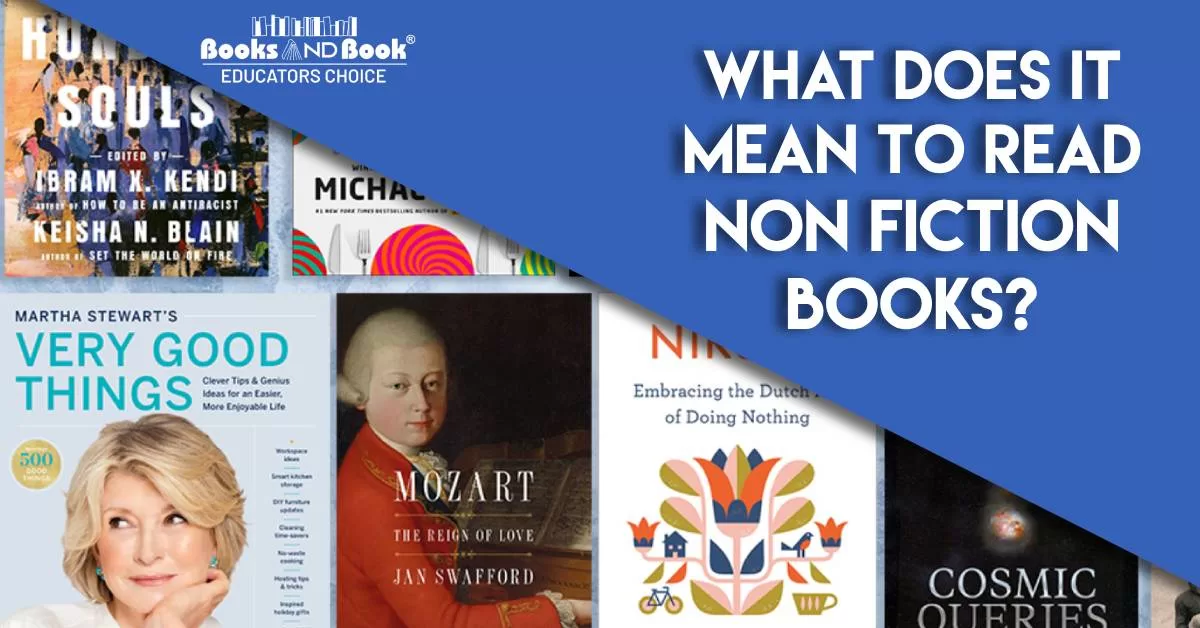In an era brimming with an endless stream of information, the act of reading non fiction books stands as a beacon of knowledge and truth.
What does it mean to read non fiction books? It’s not merely about absorbing words on a page; it’s an expedition into the realms of reality, a journey through the corridors of facts, and a deep dive into the ocean of authentic experiences.
This exploration goes beyond the meaning of reading non fiction books; it’s about the interpretation of non fiction reading as a tool for enlightenment and understanding.
What Does it Mean to Read Non Fiction Books?
Understanding non fiction book reading involves recognizing its role in providing factual, unembellished information.
Unlike fiction, non fiction does not dwell in the imaginary. It’s anchored in reality, offering insights into our world and the myriad experiences within it.
The significance of non fiction literature lies in its capacity to open doors to new knowledge, presenting facts and theories that shape our understanding of various subjects.
Types of Non Fiction Books
Non fiction literature is a mosaic of genres, each offering a unique lens through which we can view the world.
Categorizing non fiction books into genres helps readers navigate this vast landscape.
From the introspective depths of autobiographies to the chronological narratives of history, and the explorative nature of science books, each genre offers a distinct flavor of knowledge.
These genres, like biography, history, and science, are not just categories but gateways to understanding complex ideas and events.
Benefits of Reading Non Fiction
Engaging with non fiction literature is akin to unlocking a treasure trove of wisdom. The advantages of this engagement are manifold.
Reading non fiction contributes significantly to the expansion of one’s knowledge base, sharpening the mind through facts and real-life examples.
It fosters critical thinking, challenging readers to analyze and synthesize information, thereby enhancing their cognitive abilities.
How to Approach non fiction Reading
Approaching non fiction reading requires a strategic mindset, one that differs significantly from the leisurely pace of fiction. non fiction demands an active engagement, a critical eye, and a purpose-driven approach to truly reap its benefits.
1. Active Reading Strategies
Active reading is essential in non fiction to ensure comprehension and retention of information and employ these strategies for effective reading!
Highlighting and Note-Taking Techniques: Develop a system for highlighting key points and making annotations. This could involve color-coding for different themes or ideas and summarizing sections in the margins. Digital readers can use note-taking apps for similar purposes.
Engaging with the Material: Beyond just reading the text, engage with it through reflection and discussion. Ask questions, draw connections to other knowledge, and discuss these insights with others. This active engagement helps in solidifying understanding and encourages deeper exploration of the topics.
2. Fact-Checking and Verification
In an era where information is abundant, verifying the accuracy of what you read is crucial.
Importance of Verifying Information: Always question the credibility of the information presented. Understand that even non fiction can contain biases or inaccuracies.
Utilizing Credible Sources for Cross-Referencing: Cross-reference information with other credible sources. This could involve checking references, looking up studies, or reading other works on the same topic. Reliable sources include academic journals, reputable news outlets, and expert-authored books.
3. Setting Reading Goals
Establishing purposeful reading goals for non fiction books is a strategic approach to enhance both understanding and retention of the material. Here’s how to set effective reading goals:
Define Clear Objectives: Start by determining what you want to achieve with your non fiction reading. Are you looking to gain knowledge in a specific field, understand a historical event, or develop a new skill? Clear objectives will guide your book selection and reading focus.
Create Measurable Goals: Set specific, measurable goals such as the number of books you want to read in a month or the amount of time you’ll dedicate to reading each day. This quantifiable approach helps in tracking progress and maintaining motivation.
Choose Books Aligned with Your Goals: Select books that directly contribute to your objectives. If your goal is to understand economic theories, for instance, prioritize books written by renowned economists or those that have received critical acclaim in the field.
Adapt Your Reading Strategy: Tailor your reading approach based on the book’s content and your goals. For in-depth understanding, you might read more slowly, take detailed notes, or supplement your reading with other resources. For a broader overview, a quicker read-through might suffice.
Review and Reflect Regularly: Periodically assess your progress towards your reading goals. Reflect on what you’ve learned and how it contributes to your overall objectives. This reflection not only reinforces the material but also provides a sense of accomplishment.
Incorporating Non Fiction into Daily Routine
Incorporating non fiction reading into one’s daily routine can be a transformative habit, enriching both the mind and the soul. To seamlessly blend this practice into everyday life, consider the following tips:
Set Specific Times for Reading: Dedicate certain parts of your day exclusively to reading. Whether it’s during your morning coffee, on your commute, or right before bed, having a designated reading time can help establish a consistent routine.
Carry a Book Everywhere: Always have a non fiction book with you. This makes it easier to read in spare moments, whether waiting in line or during lunch breaks.
Create a Reading Nook: Designate a comfortable spot in your home as a reading nook. A dedicated space can make reading a more enjoyable and anticipated part of your day.
Combine Reading with Other Activities: Listen to non fiction audiobooks or podcasts during exercise, cooking, or while doing chores. This can make these activities more enjoyable and educational.
Join a Reading Group: Engaging with a community of readers can motivate you to read regularly. Book clubs or online forums discussing non fiction books can also enhance your understanding and enjoyment of the material.
Use Technology to Your Advantage: Utilize e-readers or reading apps on your phone. They offer convenience and can make it easier to read in any setting.
Critical Analysis of Non Fiction
Critical analysis of non fiction involves a discerning examination of the author’s perspective, urging readers to delve beyond the surface.
It’s crucial to recognize and question any biases that may color the narrative. Evaluating the reliability of the information presented is equally important, as it ensures a well-rounded understanding and prevents the absorption of skewed or inaccurate data.
This analytical approach not only deepens comprehension but also fosters a more critical and informed readership.
Conclusion
In conclusion, understanding “What Does it Mean to Read non fiction Books?” goes far beyond just recognizing them as sources of factual information.
It’s about appreciating their role in expanding our knowledge, shaping our perspectives, and contributing to personal and intellectual growth.
Whether it’s through exploring different genres, fact-checking for accuracy, or setting purposeful reading goals, non fiction books offer a world of knowledge waiting to be discovered.
As we integrate these books into our daily lives, we not only become more informed readers but also more enlightened individuals, capable of understanding and contributing to the world in meaningful ways.
FAQs
Why should I choose non fiction over fiction for reading?
Opting for non fiction allows you to learn about real-world topics, enhancing your understanding of the world around you.
How can I actively engage with non fiction reading?
Actively engage by questioning, reflecting, and connecting the content to your own experiences for a deeper comprehension.
Can non fiction reading be enjoyable and entertaining?
Absolutely, as many non fiction books are written with engaging narratives and storytelling techniques, making learning enjoyable.
What strategies can I use to retain information from non fiction books?
Employ note-taking and summarization techniques to reinforce your understanding and retention of key concepts.
Is there a specific genre within non fiction that suits my interests?
Explore various non fiction genres like history, science, or biography to find subjects that align with your personal interests and preferences.


